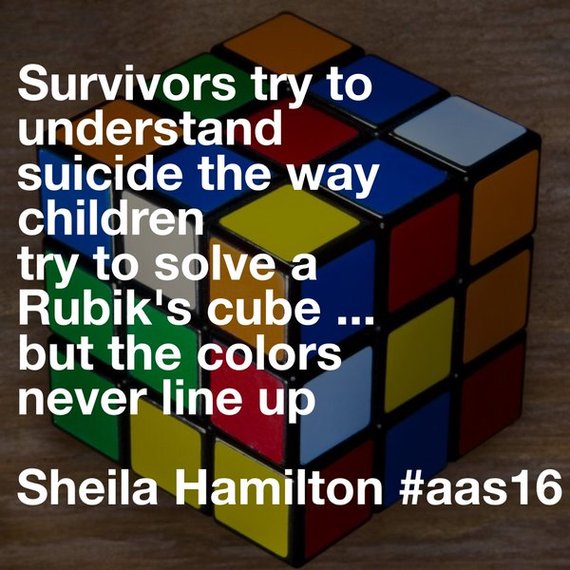If you're a loss survivor, you likely remember the phone call or news of your loved one's death because the memory is seared into your brain, like the images of the Twin Towers falling or the Shuttle exploding.
These are days when innocence is lost and all sense of wellbeing disappears. For us, it was December of 2006. It was snowing outside, one of the rare winters when snow was plentiful, even on our city streets. We'd been in a state of limbo for nearly six weeks, not knowing what had happened to my husband who had disappeared the morning after he was discharged from a psychiatric stay.
We'd somehow survived not knowing in a combination of shock, grief and denial. On this Saturday night, I'd told my daughter I'd prepare her favorite meal of crab cakes and risotto. We'd finished our meal and were sitting with close friends in front of a warm fire.
This part I'll always remember like I was in a movie, as if I was watching someone else go through the trauma: hearing the officer's kind words and soft-spoken voice as he described where they'd found my husband in the Columbia Gorge. I wondered if he was also a father of a girl who desperately loved her daddy. I hung up the phone and watched myself walk to the living room, where I held my daughter close and reminded her that it would better, one way or another, if we knew what had happened to daddy. And then I told her. I'd never heard the sound of a child's heart breaking. It is a sound so unforgiving I knew I would never stop hearing it. It would ring through my memory at exactly the same pitch, with the same intensity, reminding me of the crippling of her heart.
The deep, grieving wail she let out echoed through the home, into the street, interrupting the silence of the falling snow.
Before that night, I knew this about suicide: It was something terrible and secretive that poets and brilliant scientists did. It was sad beyond imagining. I'd heard terrible stories of other people's loss. I knew someone who might have known someone. But now I loved someone who died by suicide. Before David's death, I thought it had nothing to do with us. Mental illness doesn't discriminate. It knows no age limit, no economic status, no race, creed or color. Suicide is similar.
Now, I know the grief. I know the denial, I know the anger of being a survivor. I know how it feels to be left with unanswerable questions, and unsolvable paradoxes. Survivors try to understand suicide the way children try to solve a Rubik's cube -- but the colors never line up.
If you're a survivor, and many of you are, you know the obsession we have with, "Why."
Why, on the one hand, do we engage in almost desperate attempts to forestall our mortality and, on the other hand, love someone who actually chooses death over life.
What is causing our suicide rate to increase when deaths from other chronic illnesses are decreasing. Deaths from heart disease, cancer and diabetes are on the decline. And yet our suicide rate has increased for the 10th year in a row.
When we will understand that our attachment to shame and stigma surrounding mental illness is actually what deepens and worsens the condition?
And how do we go forward in the face of enormous grief? I'm trained as an investigative reporter. I spent 10 years studying these questions and attempting to find answers that will help us move on, together. Join me at www.sheilahamilton.com.
___________________
If you -- or someone you know -- need help, please call 1-800-273-8255 for the National Suicide Prevention Lifeline. If you are outside of the U.S., please visit the International Association for Suicide Prevention for a database of international resources.
